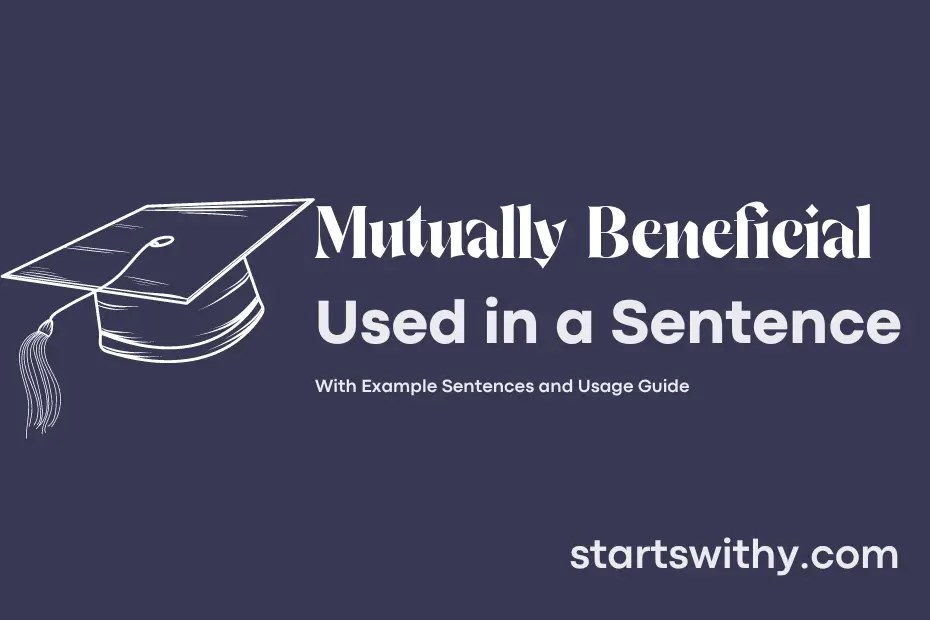Have you ever heard of the term “mutually beneficial”? This phrase refers to a situation or agreement where all parties involved benefit in some way.
In a mutually beneficial arrangement, each party receives advantages or gains that meet their needs or desires, creating a positive outcome for everyone involved.
7 Examples Of Mutually Beneficial Used In a Sentence For Kids
- We share our toys with friends because it’s mutually beneficial.
- Helping each other in class is mutually beneficial for everyone.
- Sharing our snacks at break time is mutually beneficial for all of us.
- Working together on a project is mutually beneficial for the whole group.
- Respecting each other’s ideas is mutually beneficial for our learning.
- Playing games together is mutually beneficial for building friendships.
- Listening to each other is mutually beneficial for good communication.
14 Sentences with Mutually Beneficial Examples
- Mutually beneficial study groups can help college students understand concepts better and improve their grades.
- Participating in mutually beneficial internship programs can provide valuable work experience for college students.
- Joining a mutually beneficial club on campus can help students build a network of like-minded individuals.
- Working together on group projects can be mutually beneficial for college students as they can share their knowledge and skills.
- Attending career fairs can be mutually beneficial as students can explore job opportunities and companies can find potential hires.
- Sharing lecture notes with classmates can be mutually beneficial for students who may have missed a class.
- Engaging in mutually beneficial mentorship relationships with senior students can help freshmen navigate college life.
- Collaborating on research projects with professors can be mutually beneficial for students seeking academic growth and recognition.
- Participating in cultural exchange programs can be mutually beneficial for students to broaden their horizons and learn about different cultures.
- Tutoring other students can be mutually beneficial as it helps the tutor reinforce their own understanding of the subject matter.
- Getting involved in community service projects can be mutually beneficial, allowing students to give back while acquiring new skills.
- Networking events can be mutually beneficial for students seeking internships or job opportunities in a competitive market.
- Sharing resources such as textbooks or study materials can be mutually beneficial for students looking to save money.
- Collaborating on extracurricular projects can be mutually beneficial for students to develop leadership and teamwork skills.
How To Use Mutually Beneficial in Sentences?
To Mutually Beneficial means to have a relationship or situation where both parties involved receive advantages or benefits. When using this term in a sentence, it is important to ensure that the context clearly conveys the idea of a mutually beneficial arrangement.
Here are some examples of how you can use Mutually Beneficial in a sentence:
-
“The partnership between the two companies was mutually beneficial, as they were able to share resources and reach a wider audience.”
-
“In a mutually beneficial relationship, both parties work together to achieve common goals and benefit from each other’s strengths.”
-
“The agreement was designed to be mutually beneficial, allowing both parties to prosper and grow in a competitive market.”
-
“It is essential to establish a mutually beneficial arrangement where all parties feel valued and receive fair benefits.”
-
“The collaboration between the students and the community was mutually beneficial, with both groups learning from each other and contributing to the project’s success.”
By using Mutually Beneficial in your sentences, you can effectively communicate the idea of a relationship or situation where all parties involved gain advantages or benefits.
Conclusion
In conclusion, when entities engage in mutually beneficial arrangements, they each gain advantages that contribute to their overall success. These partnerships or agreements are characterized by a shared interest in promoting the well-being and progress of all parties involved, leading to favorable outcomes for everyone. By fostering cooperation and collaboration, mutual benefit can lead to the achievement of common goals and the maximization of resources, ultimately enhancing the overall effectiveness and efficiency of the parties involved.
The concept of mutually beneficial relationships extends beyond just transactions or agreements; it encompasses a spirit of reciprocity, trust, and support that can pave the way for long-term success and sustainable growth. Harnessing the power of mutual benefit can foster strong bonds, create opportunities for mutual advancement, and cultivate a favorable environment where all parties can thrive and flourish together.



